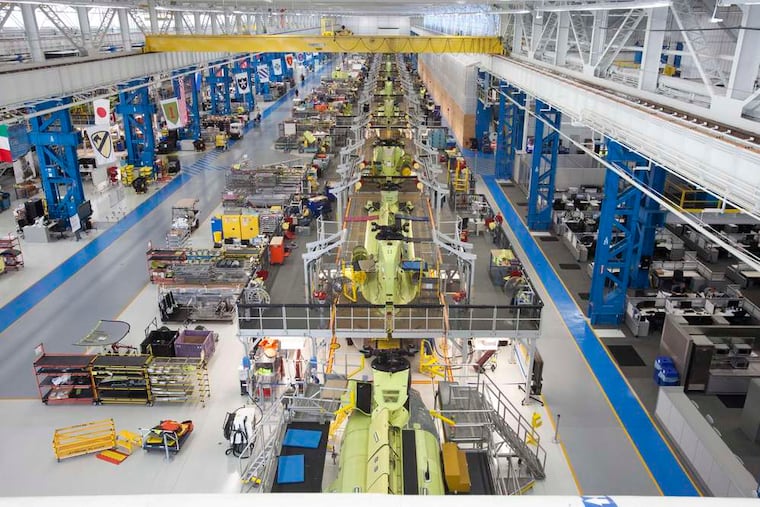Army chooses rival Texas-built helicopter over Boeing’s made-in-Pa. design
Boeing plans to ask the Army to reconsider, and it's getting more Chinook helicopter orders from abroad.

The U.S. Army has picked Textron Inc.’s Bell V-280 Valor over the rival Defiant X model from Ridley-based Boeing Vertical Lift, as the military’s faster, longer-distance replacement for aging Black Hawk assault helicopters.
The Pentagon said this week that it had awarded a contract and $232 million to prepare for production to Textron, which builds helicopters at its Bell plants in Texas.
If the Army follows through by funding the contract’s additional provisions to build hundreds of Valors, the project will be worth more than $8 billion and create or preserve thousands of jobs at Textron Bell and its suppliers for decades to come.
Also on Monday, the day the Army announced it was going with Bell Textron, Mark Cherry, a Boeing vice president and general manager of the Ridley works since April 2021, was named the new chief executive of Align Precision Corp., a Tempe, Ariz., military parts supplier. Boeing has named Kathleen Jolivette, past head of Boeing’s other helicopter factory in Mesa, Ariz., as interim replacement.
But Boeing isn’t giving up yet.
Managers of Boeing’s Pennsylvania complex, which stretches along I-95 and the Delaware between Ridley and Crum Creeks, had advocated that location for a Defiant X assembly line, which would have helped assure that plant’s continued status as the largest industrial complex remaining in the Philadelphia area, with more than 4,000 assembly, design and management jobs.
Boeing, which has long counted on the tristate area’s bipartisan congressional delegation as advocates for projects that protect Ridley jobs and suppliers, said it would work to get the Army to reconsider.
“We remain confident Defiant X is the transformational aircraft the U.S. Army requires to accomplish its complex missions today and well into the future,” according to spokesman Josh Barrett, quoting a statement from Boeing and LockheedMartin’s Sikorsky helicopter division. “We will evaluate our next steps after reviewing feedback from the Army.”
The Army picked Valor because it offers a better “value proposition,” Major Gen. Robert Barrie, the Army’s top aviation program officer, told reporters. Prototypes of both helicopters have been flying for several years, The Drive reported.
Defiant X, with two centrally mounted rotors spinning in opposite directions, was partly designed by engineers at Ridley.
Valor, by contrast, features a tilt-rotor design, with engines that can run its large propeller-rotors level as an airplane, or tilt up to hover like a helicopter — similar to Boeing’s V-22 Osprey, which was developed and is made at Ridley.
Indeed, Bell and Boeing have worked together on Osprey designs, underscoring the mix of rivalry and partnership that is common among the dominant U.S. defense contractors.
Besides Ridley, Boeing also has a newly expanded helicopter plant in Mesa, Ariz. Its partner in the Defiant X project, LockheedMartin’s Sikorsky, has its main plant near its Connecticut headquarters. Last year, that company announced the shutdown of its Coatesville, Chester County, plant, which made mostly civilian aircraft.
The Ridley plant, whose major buildings were upgraded with air conditioning and other improvements in recent years, builds two products: the Army’s familiar CH-47 Chinook heavy-lift helicopters, which have also been purchased by U.S. Special Forces and more than 20 U.S. allies, and the tilt-rotor Ospreys, a favorite of the Marine Corps, a few of which have also been sold to Japan.
Congress has pushed for the Pentagon to authorize more Chinook upgrades at the plant, despite resistance from military leaders who have argued that the United States, having ended its long wars in Afghanistan and Iraq, needs to concentrate less on 20th-century battlefield equipment and more on long-range artillery, space and electronic warfare weapons to confront threats from China and Russia.
Still, Chinook’s future seems assured for years to come. Since Russian invaded Ukraine in February, scaring central and Eastern European countries into upgrading their military defenses as they help supply their neighbor’s military resistance, Boeing has received its largest-ever foreign Chinook order — from the German army.
On Tuesday, Boeing also got approval from the State Department to sell Chinooks to South Korea.
But sources at Boeing, who asked not to be identified because they were not authorized to speak to reporters, have noted the company has less of a backlog for Ospreys, which could result in idling production for a time and shifting resources elsewhere.
The company, best known as a leading global producer of commercial jet airliners, discloses its civilian aircraft backlog but does not discuss military production with the same level of detail.
Boeing and its partners have sought since at least 2010 to develop a civilian version of the Osprey.
Boeing’s Ridley Park engineers, weapons specialists and testers are also working with Leonardo, an Italy-based defense contractor that has been expanding its helicopter assembly plant at Northeast Philadelphia Airport, to produce the MH-139A Grey Wolf, a military version of Leonardo’s civilian AW139 helicopter (whose users include the New Jersey State Police), for use by the Air Force in defending nuclear weapons launch sites and carrying government leaders.